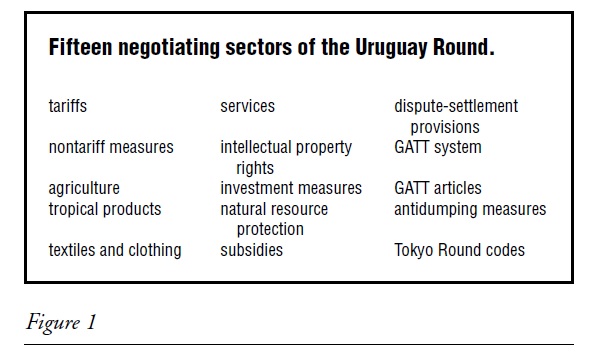This sample Uruguay Round Research Paper is published for educational and informational purposes only. If you need help writing your assignment, please use our research paper writing service and buy a paper on any topic at affordable price. Also check our tips on how to write a research paper, see the lists of research paper topics, and browse research paper examples.
The Uruguay Round, which took place between September 20, 1986, and December 15, 1993, was the eighth round of multilateral trade negotiations conducted under the General Agreement on Tariffs and Trade (GATT). The “Final Act Embodying the Results of the Uruguay Round” was signed by 124 governments and the European Communities on March 15, 1994, at a ministerial conference in Marrakesh, Morocco. The act expanded the multilateral trade regime by establishing rules for the further liberalization of trade in goods, introducing new rules for services and intellectual property rights and establishing the World Trade Organization (WTO).
Prior to the Uruguay Round, seven rounds of multilateral trade negotiations that progressively lowered tariffs on goods were held between 1947 and 1979 under the auspices of the GATT, a provisional treaty. By the early 1980s, changing trade practices, increases in trade in services, the need for stronger intellectual property rights, and a growing membership of developed and developing countries made the weaknesses of the GATT apparent. A ministerial conference held in Geneva, Switzerland, from November 24 to 29, 1982, failed to launch a new round of trade negotiations as planned but initiated the process of agenda setting.
The Uruguay Round was launched at a ministerial conference held in Punta del Este, Uruguay, from September 15 to 20, 1986. The ambitious agenda included tariffs, nontariff barriers, agriculture, textiles, services, intellectual property rights, investment, and dispute settlement (see Table 1).
The Uruguay Round negotiations encountered significant delays, due in part to the political and economic sensitivity of the issues for developed and developing member governments. A ministerial conference held in Montreal, Canada, from December 5 to 9, 1988, was suspended after a deadlock developed between the United States and the European Communities over the liberalization of agriculture. Nonetheless, this meeting resulted in concessions on tropical products, revisions to dispute-settlement provisions, and the establishment of a trade policy review mechanism. The collapse of a ministerial conference held in Brussels, Belgium, from December 3 to 7, 1990, over the issue of agriculture jeopardized the Uruguay Round negotiations.
Following nearly a year of further technical preparation within the various working groups, GATT director-general Arthur Dunkel (1932-2005), a Swiss diplomat, tabled a draft of the “Final Act” on December 20, 1991. The draft was used as a basis for continuing the negotiations. The United States and the European Communities resolved their differences over agriculture with the Blair House Accord of December 20, 1992. A meeting of the Quad (the trade ministers from the United States, the European Communities, Canada, and Japan) resulted in an agreement on a critical market-access package on July 7, 1993. Progress continued under the leadership of the next GATT director-general, Irish diplomat Peter Sutherland. In early December 1993, the United States and the European Communities compromised on antidumping measures and “agreed to disagree” for the time being on their remaining differences on audiovisual, financial, and shipping services, as well as subsidies. On December 15, 1993, although minor issues remained to be finalized, the member governments of the GATT agreed to conclude the Uruguay Round negotiations.

Figure 1
Following the ratification of the Uruguay Round agreements, a permanent WTO was established on January 1, 1995. The organization incorporated stronger dispute-settlement procedures and regular trade policy reviews of its members. The WTO governs the implementation of revised GATT multilateral rules on goods, including agricultural goods, and new rules covering services and intellectual property rights; manages the work program as outlined in some of the Uruguay Round agreements; and serves as a forum for multilateral trade negotiations.
Bibliography:
- Schott, Jeffrey. 1994. The Uruguay Round: An Assessment. Washington, DC: Institute for International Economics.
- World Trade Organization. 1998 (rev. 2001). Trading into the Future. 2nd ed. Geneva, Switzerland: WTO Information and Media Relations Division. http://www.wto.org/english/res_e/doload_e/tif.pdf.
See also:
Free research papers are not written to satisfy your specific instructions. You can use our professional writing services to buy a custom research paper on any topic and get your high quality paper at affordable price.






